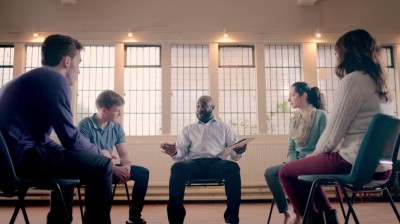Restorative Strategies offers non-punitive, community-building approach to addressing instances of harm by juveniles

Contacts:
Paul Duster
Director of Community Initiatives
paul@dbqfoundation.org
563.588.2700
Jim Jelinske
Program Director
jimjelinske@gmail.com
563.588.2700
For immediate release
An alternative to the juvenile justice system is helping set Dubuque County teens on a path to becoming productive citizens and finding future success.
With a focus on middle and high school-age youth, the Restorative Strategies program is a collaboration among civic institutions, service providers and volunteers that addresses accountability for rule-breaking, reparation, reconciliation and, ultimately, reintegration with the community.
Relationships are the core of Restorative Strategies. By providing a chance for youth responsible for committing harm to meet face-to-face with those impacted, the program fosters conversations and opportunities for youth to learn from their actions.
“Our goal is to build systems that address crimes committed by youth in a way that strengthens their relationships with the community, empowers them to grow, and enhances their responsibility and accountability to the crime committed,” says Program Director Jim Jelinske. “Ultimately, this program will help deter future interactions with the criminal justice system and open doors to opportunities that might otherwise close.”
The Community Foundation of Greater Dubuque serves as Restorative Strategies’ backbone organization and will fully develop the program with the goal of transitioning ownership to another community organization that will sustain it. In his role, Jelinske partners with the Community Foundation to document the development process, train facilitators and provide oversight for cases referred to the program.
When police are called regarding a youth, a report is generated and sent to the Dubuque County Juvenile Court Services for intake. Juvenile Court Services determines if a case meets requirements for the restorative process and makes a referral if it does.
Once a case is referred, all parties meet to explain and discuss the process and invite them to a conference known as a restorative circle. The conference is a specific process, with defined protocol, that brings together those who have caused harm through their wrongdoings with those they have directly harmed.
During the conference, all parties discuss the harm, its impact and strategies for repairing it. Everyone then comes to an agreement for reparation, and youth receive follow-up support to help complete it.
As the host organization of Restorative Strategies, the Community Foundation will work with the program’s collaborating partners — including representatives for Juvenile Court Services and the Dubuque Community School District — to build a program that meets the needs of the community today. It also will host a fund that supports the program and provide accounting and financial services.
A key component of Restorative Strategies is volunteerism. Each restorative conference is facilitated by a trained volunteer from the community, who guides the conversation and helps all parties reach an agreement on ways to repair the harm done.
Any community member interested in serving as a volunteer facilitator can contact Jim Jelinske at jimjelinske@gmail.com.
# # #
The Community Foundation of Greater Dubuque strengthens communities and inspires giving. For more information, visit dbqfoundation.org